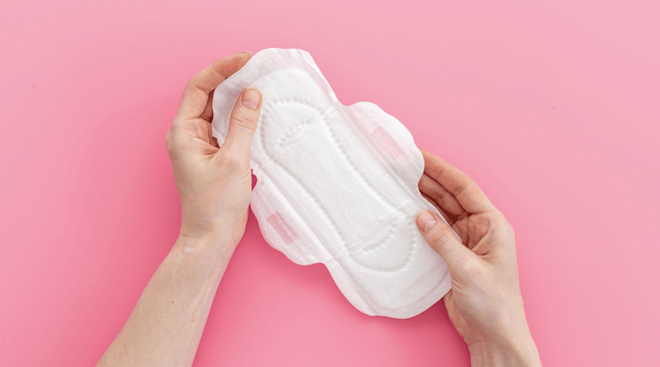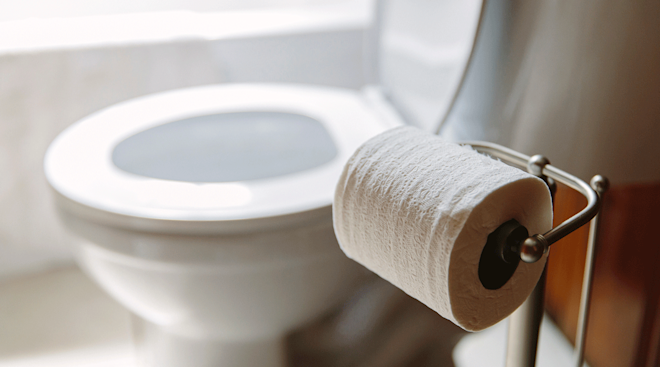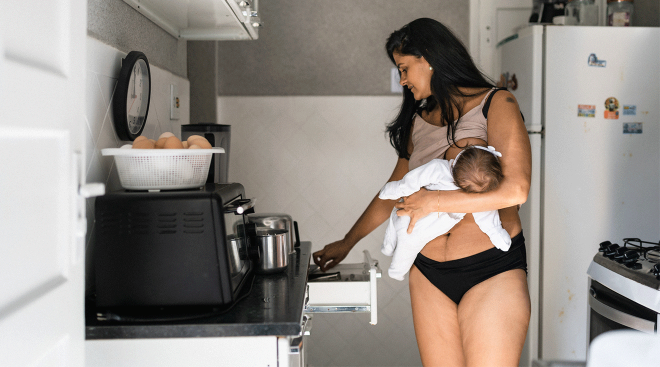7 Ways to Prepare for the Reality of the Fourth Trimester
As you count down the days to your due date, you’ll be doing a lot of preparation for baby’s arrival—getting the nursery painted and furniture assembled, stocking the freezer and washing tiny outfits. But as exciting as it is to welcome a new little one, it’s important to remember that baby isn’t the only one going through a momentous transition. As a new mom, your entire life will change in a matter of hours, but you’ll also be physically healing through the process.
In fact, the first 12 weeks after birth are such an intense time that they’re dubbed the “fourth trimester,” explains Erin Schlozman, MA, LPC, LCPC, a licensed therapist and founder of the online community 4th Trimester Wellness. “The fourth trimester is a time of tremendous growth, both for mom and baby as everyone adjusts to life after pregnancy,” Schlozman says. When baby is born, your new life as a mother is “born” too, which means you deserve just as much TLC. To help, here are some ways you can prepare for the physical and emotional changes in store for you during this exciting (and exhausting) time.
Instagram may show a shiny picture of new moms doing extraordinary things postpartum, but no matter what the outside looks like, the inside reality cannot be denied—there is still major healing going on that requires rest and attention.
Andrea Sleeth, WHNP-BC, a women’s health nurse practitioner and medical advisor at Wisp, explains that the amount of time it takes to heal can depend on several factors, such as if you had a C-section or any complications with a vaginal birth, like tearing. Here is a short timeline of some of the changes going on in your body:
- You will be bleeding for about six weeks. “Your vaginal bleeding, or lochia, will be heavy for the first few days and slowly taper throughout the following weeks until around six weeks postpartum,” says Sleeth. Bleeding is due to your cervix remaining open as your womb heals from birth.
- You might be physically uncomfortable. “You may be sore and experience discomfort in the perineum due to stretching and/or tearing during your delivery,” notes Sleeth, adding that you’ll also be very tired the few days after birth.
- Your breasts will become engorged. Even if you don’t plan on breastfeeding, giving birth triggers the production of breast milk, so you’ll also experience breast engorgement. This can last several days as your body adjusts to either feeding a baby or stopping milk production completely if you’re not breastfeeding.
- You may lose hair. Feeling like your hair is thinner? You’re not imagining it. “Hormonal changes can result in hair loss that should stop around 6 months,” Sleeth says.
Other things to look for: vaginal dryness, weight shifts, urinary changes like increased frequency and urgency and all the emotions. “It’s normal to feel sadness within the first few weeks of delivery,” Sleeth explains. “In fact, around 80% of women experience this due to hormonal shifts and lack of sleep."
As an OB nurse, I made it a point to ensure that if my patient had a partner, that partner fully knew the signs of postpartum depression (PPD) and what to do if they recognized them. Because the hard truth is, it can be difficult to recognize PPD in yourself—you’re already going through so much change, it’s tough to know what’s normal and what’s not, especially for first-time moms. Katie Fleuriet, LICSW, a therapist at PrairieCare, explains that one in five women will experience perinatal mood and anxiety disorders (PMADs). PMADs can include everything from postpartum depression to postpartum anxiety, and they can occur beginning in the fourth trimester all the way up to baby’s first birthday.
To help identify if you are experiencing a PMAD, ensure that your partner or someone close to you is educated on what to look for and who to call if a problem arises. Program both of your phones with numbers to your OB/GYN or midwife and a therapist you trust, as well as the crisis line 988 before baby is born—it makes reaching out for help that much easier. And if you don’t have a support system available to you, be sure to be brutally honest with your postpartum care provider—answer those six-week checkup questionnaires honestly and ask about any symptoms you may be experiencing. Baby’s pediatrician can also help identify symptoms of postpartum depression or anxiety, since you’ll be seeing them at well-baby visits during those first six weeks.
Parents-to-be often only hear about how horrible sleep deprivation is. But after having five babies myself and as someone who absolutely loves sleep, I am here to offer you a different message: Don’t be afraid.
Yes, sleep is crucial for all aspects of our health, but in the throes of newborn life, you can ride a postpartum wave of hormones and a body that adapts to sleeping in short increments to get you through. That being said, every person and baby is different, so if you do go through a phase where the sleep deprivation is longer-lasting or affecting your physical or mental health, it may help to have some sleep strategy tools to pull out if needed, such as:
- Sleep shifts: When skin-care consultant Catherine Dziardziel had her first baby, she split sleep shifts with her husband, allowing him the opportunity to bottle-feed, and each of them to get a solid four hours of sleep at night. “One of us stayed in the living room (which we basically turned into the nursery) and the other slept upstairs,” Dziardziel explains. “I’d sleep from 9 or 10 p.m. to 2 a.m. and then we’d switch. For pumping, I would just try to get my last pump in right before falling asleep and then again as soon as I woke up. Sleep was important or my supply would dip,” she adds.
- Outside help: Whether it’s a night nurse or doula (they may be less expensive than you think!) or just a trusted family member or friend, asking for help is necessary sometimes, so don’t be ashamed. I once had to ask my mom to come over just so I could sleep after I’d been up for 72 hours straight—one nap later, I was a completely different person.
- Sleep training: Sleep training can make all the difference for some families, so if you are struggling and baby is at least 4 months old, talk to a pediatrician about some techniques you can try.
Think of the fourth trimester as survival time: both you and baby will focus on the basics of bonding, eating and sleeping. “Focus on managing your energy, not your time,” says Schlozman. To that end, what help can you line up to preserve the limited energy you do have? Some paid options could include setting up temporary housekeeping, meal delivery or a pet sitter or babysitter for older children. If you don’t have funds to spare, you could take some time during your pregnancy to freeze some easy meals, declutter to make cleaning easier or sign up to request postpartum meals from Lasagna Love, a nonprofit that connects volunteers to people who need temporary help with meals.
And when in doubt, remember that it is a strength to ask for help, and that the people around you want to support you and your new little one. “I posted on Facebook that I needed people to come over because I was feeling isolated, and maybe seven or eight people did and it helped,” says Liz Brown, an LA-based parent. “I needed to be around people.”
There are certain undeniable postpartum physical changes that happen for everyone, but at the same time, every single mother and baby are different with every pregnancy. Even mothers who have gone through pregnancy before can have a wildly different experience the second or third time around. Don’t compare anyone else’s journey to yours (whether that’s real-life friends or what you see on social media).
Even if you plan on full-time breastfeeding, it’s a great idea to have some bottles and formula or pumped milk readily available so other caregivers can take over a feeding, or in the case of an emergency. I speak from experience saying this, having been unexpectedly hospitalized and separated from my first baby a week after she was born.
It’s also helpful to have bottles on hand if formula or bottle-feeding turns out to be a good choice for you and baby’s health. Using a bottle that mimics breastfeeding, like Philips Avent Natural bottles, can also help make the transition easier. “Bottle-feeding can be very helpful to a new parent’s mental health,” Fleuriet points out. “It can create a sense of autonomy for the breastfeeding parent. It can also provide time and permission to engage in self-care while allowing other caregivers to create connections with the baby.”
And if you’re struggling with guilt over bottles, here’s a point to consider: After I was so insistent on always breastfeeding my kids, my husband actually thanked me for the unique chance at bonding that bottle-feeding our youngest gave him. Keep in mind that bottle-feeding can allow more of your loved ones to have that incredible bonding opportunity, and give you a much-needed break.
Our Pick:
Philips Avent Natural Response baby bottle
The natural response nipple only releases milk when a baby actively drinks, as with breastfeeding. The natural release allows for milk flow to pause when baby stops drinking to catch their breath or swallow. Plus, the wide, flexible nipple helps baby latch on comfortably, which makes combining breastfeeding and bottle-feeding easier.
Our last tip is one that will be applicable throughout your entire life as a parent, because raising kids means constantly adapting to new stages. Give yourself time to adjust to each new season and challenge of motherhood, and most importantly give yourself credit for all you are doing along the way. “Remember that postpartum care is an ongoing process, not just a single visit at six weeks,” says Schlozman. “And a hard day doesn’t mean you’re failing—it just means you’re having a hard day.”
Philips Avent understands that we can best take care of baby when we take care of ourselves too. That’s why they create products that help parents around the world find solutions to their struggles, so they can focus on taking more time for themselves and connecting as a family. Read more on The Bump.com.
Please note: The Bump and the materials and information it contains are not intended to, and do not constitute, medical or other health advice or diagnosis and should not be used as such. You should always consult with a qualified physician or health professional about your specific circumstances.
Erin Schlozman, MA, LPC, LCPC, is a licensed therapist and founder of the online community 4th Trimester Wellness. Her Substack, This Postpartum Life, explores motherhood in the fourth trimester and beyond.
Andrea Sleeth, WHNP-BC, is a Missouri-based women’s health nurse practitioner with Visana Health as well as with Wisp, where she also serves as a medical advisor.
Katie Fleuriet, LICSW, is a therapist with PrairieCare in Minnesota. She is a mother of two children herself and has specific training in perinatal mental health.
Navigate forward to interact with the calendar and select a date. Press the question mark key to get the keyboard shortcuts for changing dates.




























































